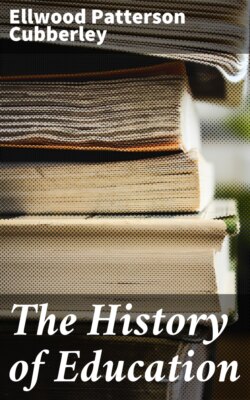Читать книгу The History of Education - Ellwood Patterson Cubberley - Страница 30
На сайте Литреса книга снята с продажи.
II. THE PERIOD OF HOME EDUCATION
ОглавлениеTHE EARLY ROMANS AND THEIR TRAINING. In the early history of the Romans there were no schools, and it was not until about 300 B.C. that even primary schools began to develop. What education was needed was imparted in the home or in the field and in the camp, and was of a very simple type. Certain virtues were demanded—modesty, firmness, prudence, piety, courage, seriousness, and regard for duty—and these were instilled both by precept and example. Each home was a center of the religious life, and of civic virtue and authority. In it the father was a high priest, with power of life and death over wife and children. He alone conversed with the gods and prepared the sacrifices. The wife and mother, however, held a high place in the home and in the training of the children, the marriage tie being regarded as very sacred. She also occupied a respected position in society, and was complete mistress of the house (R. 17).
The religion of the city was an outgrowth of that of the home. Virtue, courage, duty, justice—these became the great civic virtues. Their religion, both family and state, lacked the beauty and stately ceremonial of the Greeks, lacked that lofty faith and aspiration after virtue that characterized the Hebrew and the later Christian faith, was singularly wanting in awe and mystery, and was formal and mechanical and practical [8] in character, but it exercised a great influence on these early peoples and on their conceptions of their duty to the State.
The father trained the son for the practical duties of a man and a citizen; the mother trained the daughter to become a good housekeeper, wife, and mother. Morality, character, obedience to parents and to the State, and whole-hearted service were emphasized. The boy's father taught him to read, write, and count. Stories of those who had done great deeds for the State were told, and martial songs were learned and sung. After 450 B.C. every boy had to learn the Laws of the Twelve Tables (R. 12), and be able to explain their meaning (R. 13). As the boy grew older he followed his father in the fields and in the public place and listened to the conversation of men. [9] If the son of a patrician he naturally learned much more from his father, by reason of his larger knowledge and larger contact with men of affairs and public business, than if he were the son of a plebeian. Through games as a boy, and later in the exercises of the fields and the camps, the boy gained what physical training he received. [10]
[Illustration: FIG. 19. A ROMAN FATHER INSTRUCTING HIS SON
(From a Roman Sarcophagus)]
EDUCATION BY DOING. It was largely an education by doing, as was that of the old Greek period, though entirely different in character. Either by apprenticeship to the soldier, farmer, or statesman, or by participation in the activities of a citizen, was the training needed imparted. Its purpose was to produce good fathers, citizens, and soldiers. [11] Its ideals were found in the real and practical needs of a small State, where the ability to care for one's self was a necessary virtue. To be healthy and strong, to reverence the gods and the institutions of the State, to obey his parents and the laws, to be proud of his family connections and his ancestors, to be brave and efficient in war, to know how to farm or to manage a business, were the aims and ends of this early training. It produced a nation of citizens who willingly subordinated themselves to the interests of the State, [12] a nation of warriors who brought all Italy under their rule, a calculating, practical people who believed themselves destined to become the conquerors and rulers of the world, and a reserved and proud race, trained to govern and to do business, but not possessed of lofty ideals or large enthusiasms in life (Rs. 15, 16).
